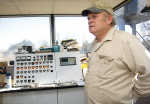Rock on; County saves taxpayers money by keeping its own quarries for local roads

Whether it be a quiet Sunday drive or the daily commute to work, it's easy to take the road under your wheels -- and what it takes to keep it driveable -- for granted.
About 12 years ago, Bourbon County Commissioners found a way to produce some of their own materials to maintain part of the estimated 1,000 miles of roads in Bourbon County, and in turn, saved taxpayers a bundle of cash.
Somewhere around the turn of the millennium, county commissioners bought a crusher and opened the Blake Quarry on leased land near 145th and Kansas. Previously, the county had been buying the rock from a local company. That became the county's first quarry -- the Blake Quarry -- and was opened as a cost-saving measure.

And save it did.
Commissioner Allen Warren said that in 2010 it cost Bourbon County $3.55 a ton to produce gravel for county roads from the quarries. The county operates quarries at the Beth Quarry near Hammond and the George Quarry near 55th Street and U.S. Highway 54. Prior to that, the county had received a discounted price of $5 per ton from a local vendor and that figure was expected to increase to about $6 per ton. In 2010, the county produced about 140,000 tons of crushed rock, some for chip and sealing, some for asphalt and some for graveling roads.
That year alone, the county saved an estimated $200,000 to $343,000 (depending on vendor price fluctuations) by operating its own quarry. Last year, the county produced 100,000 tons of rock and is expected to produce about 80,000 tons this year.

Warren said the drop off this year was due in part to a learning curve on a new crusher the county purchased and the fact that some equipment also was being kept busy with reclamation at the Blake Quarry.
"This year is short on overall tonnage," Warren said. "Next year I expect to see us in the neighborhood of 120,000 tons."
Even with this year's reduction, it could be estimated that the county still saved about $116,000 to $196,000 this past year and about $145,000 to $245,000 in 2011. In the past three years alone, the total savings to the county could be estimated to be somewhere between $461,000 and $784,000.
Land for the quarries is leased from private landowners who receive 25 cents per ton for the first 40,000 tons produced from their land each year and 20 cents for every ton beyond that, committing the county to a minimum payment of $10,000 per year per site.
Warren said that several other counties have noticed the cost-effectiveness of running their own quarries too, including Allen and Neosho.
The Blake Quarry's lease is now up and workers are busy with reclamation of the leased land as backhoes, graders and other large pieces of equipment move piles of dirt around in what will soon be a scenic, grassy area overlooking the beginnings of what could be called a small lake.
And unlike some other resources, the county has little trouble finding what they are after in the quarries.
"There is most definitely plenty of rock in Bourbon County," Warren said. "Down the road we will be looking at potentially opening a third quarry, somewhere where it makes the most business sense, probably more in the central part of the county. The two quarries that we are using now, George and Beth, were already opened, so we could see the rock there."
Warren said the most important criteria for selection of a site would be both the quantity and the quality of rock present. Workers typically spend about two to three months at an individual quarry before moving the equipment to another one. Warren said the crusher, conveyors and other necessary equipment can conceivably be moved and operational within a day. Some of the larger pieces, such as the new crusher and screen plant (which separates rock by size), can be hand-driven by remote control to be loaded onto a semi.
"The flexibility that gives us is a real plus," Warren said.
The county is currently planning to resume operations near Hammond at the Beth Quarry, while they finish up reclamation at the 33-foot-deep Blake Quarry and prepare to move equipment from there and the George Quarry to Hammond. Workers had reached the point at Blake where too much shale was present, so working that quarry was no longer beneficial. Warren said the shale is too soft to stand up to the weight of vehicles to be used on roads. He also said he has talked to contractors who said that the Hammond area has the best rock in Bourbon County.
Warren said it takes about three employees to run a quarry, which are typically named after whoever leases the property to the county.
While crushing operations have ceased at Blake, the operation of the Bourbon County Asphalt plant, which produces asphalt, chip and seal and cold patch for overlay and filling of potholes on county roads continues on an area of leased property adjacent to the quarry, which the county leases for $6,000 per year.
Quarry Supervisor Richard Smith oversees the day-to-day operations of the plant, which produces materials on an as-needed basis. Smith controls the amount of sand gravel and other materials that go into an asphalt mixture from a control center at the plant.
